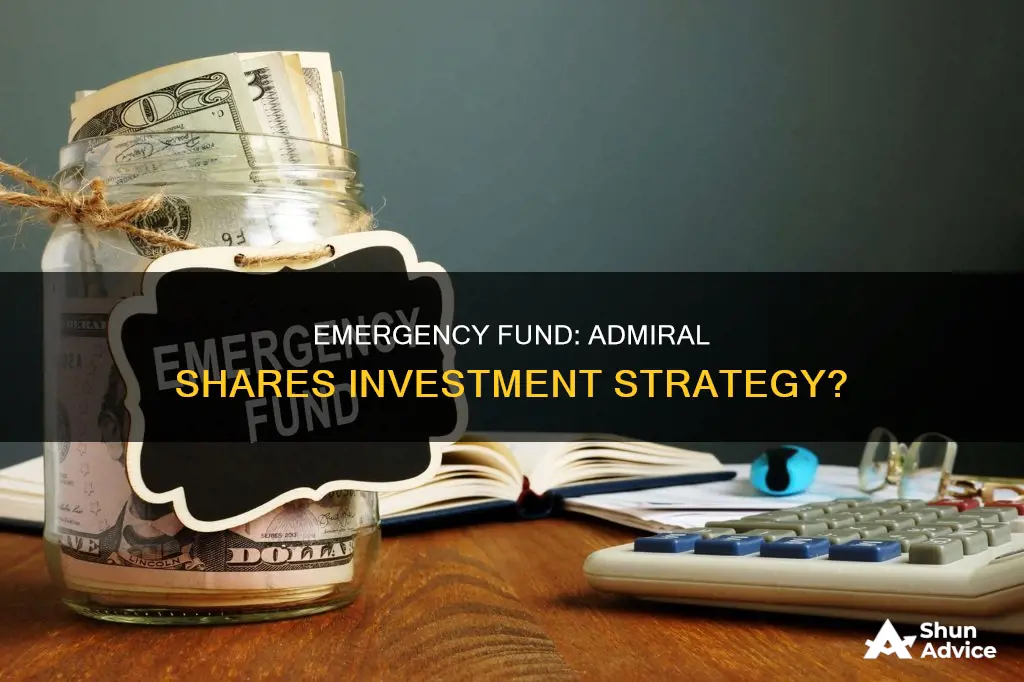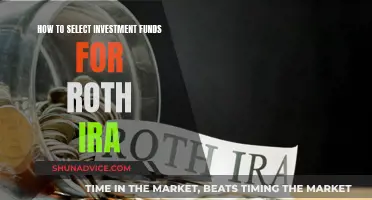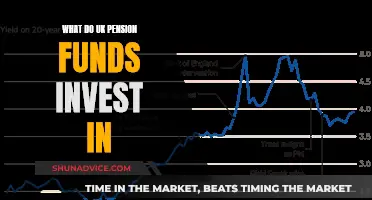
Investing your emergency fund can be a risky move. While it's tempting to invest your emergency fund to grow your balance, it could be disastrous if your assets lose value by the time you need to make a withdrawal.
Emergency funds are designed to be a safety net in the case of unexpected expenses, such as car repairs, medical bills, or job loss. Experts recommend having three to six months' worth of savings in an emergency fund.
While it may seem like a waste to keep your emergency fund in a savings account, it's important to remember that investing comes with risks. When you invest your emergency fund, you run the risk of losing your initial investment if the value of your assets falls. With a savings account, your initial deposit is preserved for when you need it.
Additionally, when you invest money into a taxable brokerage account, you'll be responsible for paying taxes when you sell shares and realize your gains. The tax rate you'll pay depends on how long you've held the shares, with short-term capital gains taxed at your regular income tax rate, and long-term capital gains taxed between 0% and 20%.
If you're looking to grow your emergency fund, a safer option is to put your money into a high-yield savings account. This will allow you to preserve your total balance, earn interest, and have quick access to your funds when needed.
| Characteristics | Values |
|---|---|
| What are Admiral Shares? | A separate class of shares in Vanguard-administered mutual funds, offering lower fees compared to the standard Investor Share class. |
| Who are Vanguard? | A company that launched Admiral Shares to allow an investor to build on a strategy of holding the same stocks of an index, keeping management costs low, and winning by simply matching the performance of the index. |
| What are the benefits of Admiral Shares? | Lower fees, lower expense ratios, and low investment minimums. |
| What are the requirements for Admiral Shares? | A minimum investment of $3,000 for most index funds, $50,000 for most actively managed funds, and $100,000 for certain sector-specific index funds. |
| What is the average expense ratio for Vanguard's Admiral Shares? | 0.14%. |
| What is an emergency fund? | A separate account with money set aside to pay for large, unexpected expenses. |
| Why invest your emergency fund? | To beat inflation, which destroys large sums of cash sitting in traditional bank accounts over time. |
| Why not invest your emergency fund? | It is risky and could result in losing money. |
| Where should you put your emergency fund? | A savings account with a high interest rate and easy access. |
What You'll Learn

The pros and cons of investing emergency funds in admiral shares
Admiral Shares represent a separate class of shares in Vanguard-administered mutual funds, offering lower fees compared to the standard Investor Share class.
Pros
- Lower fees: Admiral Shares have a lower expense ratio compared to Investor Shares. While typical Vanguard Investor Shares have an average expense ratio of 0.28%, Vanguard Admiral Shares' average expense ratio is 0.14%.
- Cost savings: The expense ratios of Admiral Shares are well below the industry average, helping investors build more wealth over time.
- Affordability: Admiral Shares combine low expense ratios with low investment minimums, making investing more accessible.
- Potential for higher returns: Investing emergency funds can help combat the effects of inflation, which can slowly eat away at the value of money kept in traditional savings accounts over time.
Cons
- Risk of losing money: Investing emergency funds is risky and not suitable for everyone. There is a chance that you may lose money, which defeats the purpose of having an emergency fund in the first place.
- Limited liquidity: Investing emergency funds limits immediate access to your money. You may also incur penalties for withdrawing invested funds.
- Market volatility: The value of your investments may decrease at the precise time you need the money, such as during a market correction or a black swan event.
- Taxes: Withdrawing money from a taxable brokerage account may result in short-term or long-term capital gains taxes, reducing your overall returns.
In conclusion, while investing emergency funds in Admiral Shares offers the potential for higher returns and lower fees, it also comes with increased risk and reduced liquidity compared to traditional savings accounts. It is essential to carefully consider your financial situation, risk tolerance, and investment goals before deciding whether to invest your emergency funds.
Collaborative Fund Investment: Strategies for Success
You may want to see also

How to invest in admiral shares
Admiral Shares are a separate class of shares in Vanguard-administered mutual funds, offering lower fees compared to the standard Investor Share class. To qualify for Admiral Shares, investors in most index funds and tax-managed funds must maintain a minimum investment of $3,000. For actively managed funds, the minimum investment is $50,000. For sector-specific index funds, an investor qualifies for Admiral Shares with an investment of $100,000 or more. The average expense ratio for Vanguard's Admiral Shares is 0.14%.
Vanguard offers Admiral Shares mutual funds with a broad palette of investment objectives and holdings, such as Treasury bonds (T-bonds), tax-exempt municipal bonds, balanced holdings, domestic stocks, and international stocks.
Vanguard offers over 100 funds available as Admiral Shares. If you're specifically interested in index funds, you'll be able to select from 44 index funds available for a $3,000 minimum.
- Determine your eligibility: To qualify for Admiral Shares, investors must meet the minimum investment requirements as outlined above.
- Evaluate your risk tolerance: Investing in Admiral Shares carries some risk, so it's important to consider your risk tolerance and financial goals before investing.
- Open a Vanguard account: If you don't already have one, you'll need to open a Vanguard account to access their Admiral Shares offerings.
- Research and select the specific Admiral Shares funds you want to invest in: Vanguard offers a wide range of Admiral Shares funds across different categories, including international bond funds, international stock funds, and sector and specialty funds.
- Make your investment: Once you've determined your eligibility, evaluated your risk tolerance, and chosen the specific Admiral Shares funds you want to invest in, you can proceed to make your investment through your Vanguard account.
Remember to do your own research and consult with a financial advisor before making any investment decisions.
Choosing an Investment Fund: Key Considerations
You may want to see also

The risks of investing emergency funds in admiral shares
Investing emergency funds in admiral shares is risky and not recommended. Here are some reasons why:
Risk of Losing Money
When you invest your emergency fund, you risk losing your initial investment if the value of your assets falls. In contrast, putting your money in a savings account preserves your deposit for when you need it. For example, if you deposit $5,000 into a savings account, you will still have the same amount a few months later. However, if you invest that $5,000 into stocks or index funds, there is a chance that their value could decrease, leaving you with less money to cover unexpected expenses.
Stress During a Market Downturn
Investing your emergency fund means that during a market crash, you may have to worry about both your job security and the decreasing value of your emergency fund. This additional stress may not be worth the potential gains from investing.
Tax Consequences
When you invest money into a taxable brokerage account, you will be responsible for paying taxes when you sell shares and realize gains. The tax rate depends on how long you have held the shares. If you have to sell assets that you have owned for less than a year due to an emergency, you will likely owe more in taxes compared to holding them for over a year.
Lack of Liquidity
Investing your emergency fund may limit your immediate access to money. You may even incur penalties for withdrawing invested funds. In contrast, savings accounts offer high liquidity, allowing you to withdraw funds quickly during emergencies.
UK Funds: Your Investing Journey Simplified
You may want to see also

The tax implications of investing emergency funds in admiral shares
When deciding whether to invest emergency funds in Admiral Shares, it is important to consider the tax implications that may arise. Here are some key points to keep in mind:
- Taxable Gains: By law, mutual funds are required to distribute any net gains they realise to their shareholders at least once a year. This means that even if you haven't sold any of your Admiral Shares, you may still be liable for taxes on gains made by the fund.
- Capital Gains Taxes: Both mutual funds and ETFs are subject to capital gains taxes. When you sell Admiral Shares or other mutual fund investments for a profit, you will owe capital gains taxes on that profit. The amount of tax you pay will depend on whether the gains are short-term or long-term, which is determined by how long the fund held the securities before selling.
- Dividend Income Taxes: Dividend income from your investments in Admiral Shares or other mutual funds is also taxable. You will need to pay taxes on any dividend income you receive, regardless of whether you choose to reinvest those dividends or receive them as cash.
- Expense Ratios: The expense ratios of your investments can impact your tax liability. ETFs typically have lower expense ratios than mutual funds, which can result in lower taxes. Vanguard's Admiral Shares are designed to have lower expense ratios than their standard Investor Shares, which may reduce your tax burden.
- Transaction Costs: It's important to consider the transaction costs associated with buying and selling Admiral Shares or other mutual funds. While Vanguard does not charge sales loads or commissions on most of its funds, there may be other costs such as brokerage commission fees when trading ETFs. Additionally, some funds may have redemption fees to discourage short-term trading.
- Tax-Efficiency: ETFs generally tend to be more tax-efficient than mutual funds. They often have lower expense ratios and can be more flexible in terms of buying and selling throughout the day. However, it's important to note that ETF trades may incur brokerage commission fees.
- Investment Horizon: If you are investing your emergency funds for the long term, the tax implications may be different from short-term investments. Long-term investments may benefit from compound growth, which can impact your tax liability over time.
- Risk and Returns: It's important to balance the risk and returns of your investments with the potential tax implications. While investing in Admiral Shares may offer lower fees and potentially higher returns, there is also the risk of losing money, which could impact your tax situation.
- Diversification: Diversifying your emergency fund investments across different types of accounts and investment vehicles can help manage risk and tax liability. Consider a mix of taxable brokerage accounts, tax-advantaged retirement accounts, and other investment options to optimise your tax situation.
- Professional Advice: Consult a tax professional or financial advisor to understand the specific tax implications of investing your emergency funds in Admiral Shares. They can provide personalised advice based on your financial situation and help you make informed decisions.
Direct Mutual Fund Investment: A Step-by-Step Guide
You may want to see also

Alternatives to investing emergency funds in admiral shares
Investing emergency funds in admiral shares is not a good idea for everyone. Here are some alternative options for investing emergency funds:
High-yield savings accounts
High-yield savings accounts are a good option for those who want easy access to their emergency funds. These accounts typically offer an interest rate of around 2% APY, which can help protect your money from inflation. However, it's important to note that with inflation at around 3% annually, you will still lose some money to inflation even with a high-yield savings account.
Money Market Accounts
Money Market Accounts are a safe alternative to high-yield savings accounts, offering slightly higher returns and FDIC protection. They also come with debit cards and check-writing privileges. However, they may have fees, minimum balance requirements, and limited monthly withdrawals.
Money Market Mutual Funds
Money Market Mutual Funds are similar to Money Market Accounts but are obtained through brokerage and mutual fund companies. They invest in safe vehicles like CDs and short-term debt, and the money can be accessed at any time. However, these accounts are not FDIC-insured and may have expense fees.
Certificates of Deposit (CDs)
CDs are considered one of the safest investment options and usually offer a slightly higher return than a savings account. Look for No-Penalty CDs to avoid losing money if you need to withdraw funds before the maturity date. CD laddering can also help spread out the risk of tying up funds for long periods.
Health Savings Account (HSA)
If you have a High Deductible Health Insurance Plan (HDHP), investing your emergency funds in an HSA can be a good option. Many HSAs allow you to decide how the money is invested, and you can withdraw your contributions at any time without penalty.
Brokerage (Taxable Investment) Accounts
Brokerage accounts offer the potential for higher returns by investing in stocks, but they also come with more volatility. Bonds are a more stable option but may sacrifice returns. Index or exchange-traded funds are generally recommended over individual stocks or bonds. You can sell assets and withdraw funds from brokerage accounts without penalty, but you may have to pay transaction fees and taxes on earnings.
Mutual Funds: High-Risk Investment Gamble?
You may want to see also
Frequently asked questions
Admiral Shares represent a separate class of shares in Vanguard-administered mutual funds, offering lower fees compared to the standard Investor Share class.
Benefits of owning Admiral Shares include keeping your costs under control, making investing more affordable for everyone, and enjoying expense ratios that are, on average, 52% lower than Vanguard's standard Investor Share class and 72% lower than the industry average.
Investing your emergency fund could be disastrous if your assets lose value by the time you need to make a withdrawal. There will also be a tax consequence when selling assets and withdrawing from a taxable investment account.
A high-yield savings account is a good alternative to investing your emergency fund. It will allow you to preserve your total balance regardless of market volatility, and you'll earn interest just for keeping your money in the account.
A good rule of thumb is to have enough to cover three to six months' worth of living expenses.







